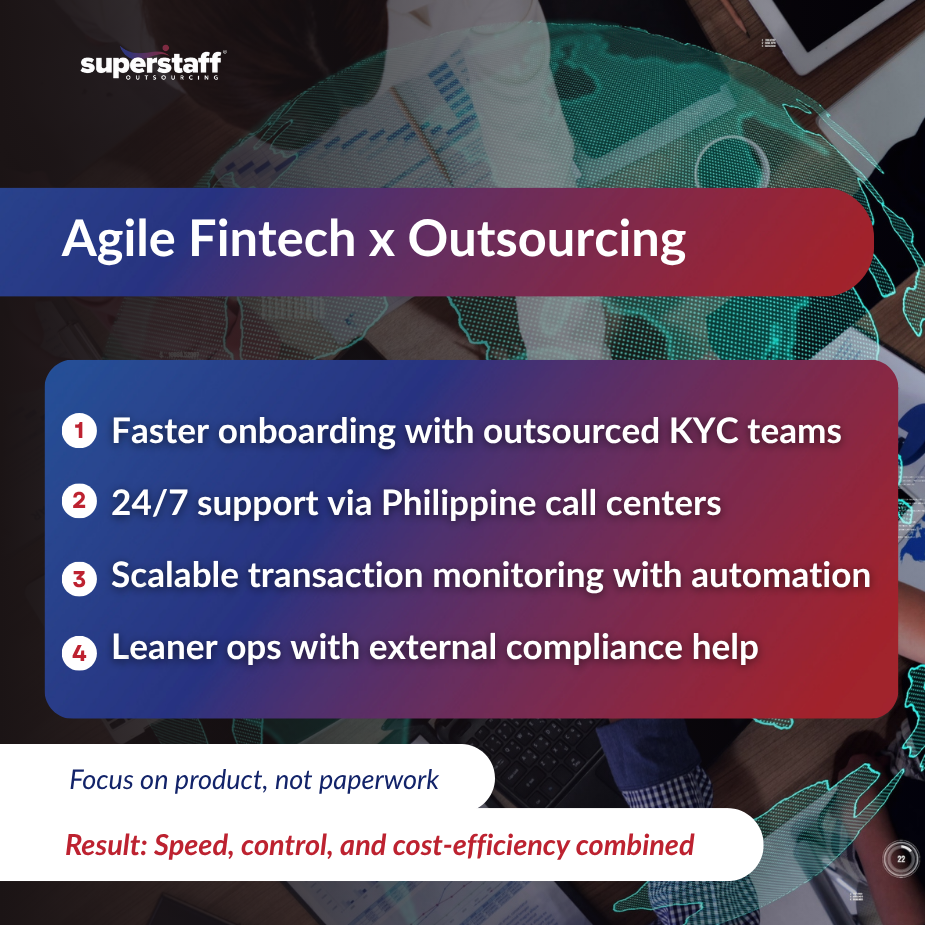
Fintech companies grow fast and change often. To stay competitive, they must adapt quickly, stay compliant, and keep costs low. Many startups and mid-sized firms in this space do not have large internal teams, so they rely on outsourcing to get things done. One approach gaining momentum is to build agile fintech operations using outsourced automation services.
This article explores how companies are building agile fintech platforms with outsourced automation expertise. It also explains how services like Philippine call center outsourcing and fintech robotic process automation support flexibility, speed, and scale.
Outsourcing no longer means giving away control. It means getting expert support for everyday operations—so your core team can stay focused on innovation.

Why Agile Fintech Needs Operational Flexibility
Agility in fintech means being able to shift direction fast, meet new regulations, serve more users, and launch updates quickly.
1. Speed to Market
Agile fintech companies need to launch and adjust services fast. Outsourcing non-core tasks helps teams focus on development and delivery.
2. Cost-Efficient Scaling
Growing fintech platforms often face sudden increases in users or transactions. Outsourced teams offer flexible support without long hiring cycles.
3. Compliance Readiness
Regulations change quickly in financial services. Outsourcing partners can provide help with data handling, audits, and reporting, keeping the business compliant.
4. User Experience Support
Agile fintech teams use Philippine call center outsourcing to manage customer queries. This keeps service levels high even during sudden growth.
5. Lean Internal Teams
By offloading repetitive tasks through automation and support teams, fintech companies keep their in-house resources lean and focused on strategy.
How Automation Supports Agile Fintech Growth
Automation is key to managing repetitive, rule-based tasks without delays. When combined with outsourcing, it becomes a powerful solution for fast-growing fintech platforms.
1. Fintech Robotic Process Automation (RPA)
RPA handles time-consuming back-office functions. Tasks like document checks, ID verification, and transaction matching can be automated for speed and accuracy.
2. Fraud Monitoring
Systems flag suspicious transactions, but outsourced teams verify and escalate them as needed. This balance helps reduce risk while managing cost.
3. KYC and Onboarding
Automation tools extract data from customer documents, while human teams verify and complete the process. This speeds up onboarding without sacrificing accuracy.
4. Payment Processing
Routine payment checks and settlements can be automated, with outsourced teams ensuring issues are resolved quickly when exceptions occur.
5. Support Ticket Triage
Tickets can be sorted automatically based on keywords, while outsourced support teams respond and resolve issues based on severity.
Use Cases for Building Agile Fintech Platforms with Outsourced Automation Expertise
Let’s look at how agile fintech businesses use outsourced automation across key areas.
1. Customer Support
Outsourced agents provide 24/7 support, trained to handle fintech-specific issues. Automation tools assist with FAQs, routing, and escalation.
2. Data Entry and Validation
Fintech platforms deal with large volumes of sensitive data. Outsourced teams help capture and validate this data with speed and accuracy.
3. Transaction Monitoring
Automated systems review transactions in real time. Outsourced analysts follow up on anomalies to ensure compliance and prevent fraud.
4. Content and Policy Management
From FAQs to compliance notices, agile fintech companies must update documents often. Outsourced content teams help keep platforms up to date.
5. Compliance Reporting
Outsourced teams gather data, format reports, and help prepare documents required for audits or regulatory submissions.
Best Practices for Outsourcing in Agile Fintech
To make outsourcing work, fintech companies must plan clearly and build the right processes.
1. Start with the Right Tasks
Choose repeatable, structured tasks first, such as support responses, transaction logging, or ID verification.
2. Select Industry-Specific Partners
Work with outsourcing teams that understand fintech tools, workflows, and security standards.
3. Define Escalation and Feedback Loops
Build clear processes for when automation fails or tasks require manual intervention. Escalation paths should be easy to follow.
4. Focus on Training and Integration
Your outsourcing partner is part of your team. Provide training, access to tools, and ongoing communication to align goals.
5. Track KPIs and Improve Over Time
Set service-level agreements (SLAs), monitor performance, and adjust based on feedback and evolving needs.
SuperStaff’s Role in Agile Fintech Outsourcing
SuperStaff helps fintech companies stay agile through reliable outsourcing services. With experience in fintech operations, SuperStaff supports automation efforts while providing skilled human teams for complex tasks.
SuperStaff offers:
- Trained support teams for customer service, fraud alerts, and transaction handling
- Back-office teams to help with compliance, onboarding, and data verification
- Scalable staffing models to support rapid growth or seasonal demand
- Specialized expertise in fintech robotic process automation workflows
- Philippine call center outsourcing to provide round-the-clock global support
By combining people and systems, SuperStaff enables fintech companies to stay flexible and efficient.
Scalable Outsourcing for Agile Fintech Growth
Outsourced automation helps agile fintech businesses remain competitive while keeping costs under control. It allows you to scale fast, meet changing demands, and maintain compliance without adding pressure on internal teams.
SuperStaff is a trusted partner for fintech firms seeking automation expertise and operational support. From transaction monitoring to customer care, our teams are ready to help you build a flexible and future-ready platform. Talk to us to start building your agile fintech strategy today.






